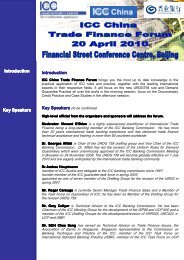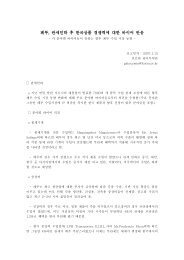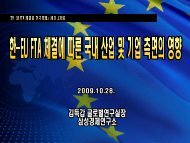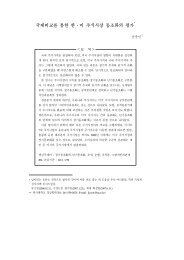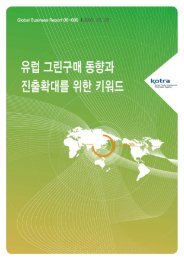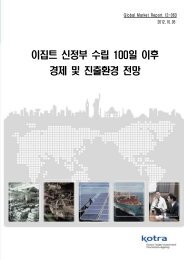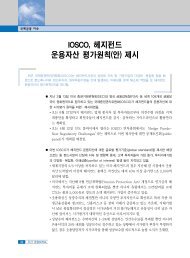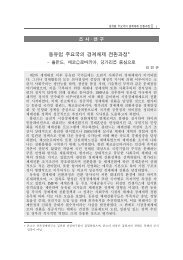Contents
Contents
Contents
- No tags were found...
Create successful ePaper yourself
Turn your PDF publications into a flip-book with our unique Google optimized e-Paper software.
acquired a high value on the European markets. Trade relations with Austria,Germany, France and Great Britain strengthened. In 1989 the peaceful end of thetotalitarian regime and the centrally planed economy falls into the pattern ofchanges in Eastern Europe. Bulgaria took the road of a new democratic development,towards a free market economy. In 2004 Bulgaria joint the NATO alliance.Since January 1 st 2007 Bulgaria is EU member state.1.3. GovernmentBulgaria is a parliamentary republic that abides by the Constitution of the Republicpassed by the Grand National Assembly in July 1991. The Constitution ofthe Republic of Bulgaria is the supreme law of the country and no other lawmay contravene it. All international treaties, which are ratified pursuant to theconstitutional procedure, are considered part of the domestic legislation.The National Assembly is a one-chamber parliament. It consists of 240 Membersof Parliament who are directly elected every four years.The National Assembly isa permanent acting body, directed by a board of Chairmen including a Chairmanof the National Assembly.The head of the state is the President, who embodies the unity of the nation andrepresents the Republic of Bulgaria in its international relations.The Council of Ministers is the executive state body that directs the domestic andforeign policy of the country. The government manages the implementation ofthe state budget, organizes the management of state property and approves orrescinds certain categories of international treaties pointed out in the Constitution.During the democratic process, there has been a smooth transfer of power, astrengthening of state institutions and a consensus amongst all political partiestowards promoting the market economy and respecting human rights.1.4. Administrative Territorial DivisionThe territory of the Republic of Bulgaria is divided into 278 municipalities and28 regions. Municipalities are legal entities and have the right of ownership andindependent municipal budgets. The municipal council is the local governmentauthority, which determines the policies for development of the municipality.The regions are administrative-territorial units, which implement the regionalpolicy of the central government. The regions’ management is carried out by aregional governor and regional administration at the cost of the state budget.Regional governors are appointed by the Council of Ministers.4 BSMEPA
1.5. Currency and Exchange ControlThe new Law on the Bulgarian National Bank voted by the Parliament in June1997, and the new Law on Banks adopted in July 1997, introduced a currencyboard in the country effective as of 1 July 1997. After the introduction of a currencyboard, all constraints on trading with hard currency within the countrywere removed. Local banks can sell hard currency to physical and legal entitieswithout any limitations. The local currency is internally convertible.The currency unit in Bulgaria is the Bulgarian Lev. Before 5 July 1999 it was denotedas BGL. Afterwards, the Bulgarian Lev has been denominated in a ratioBGL 1,000 to BGN 1. At present the BGN is pegged to the Euro at the rate of BGN1 per EUR 0.51129. Central exchange rates are quoted daily by the BulgarianNational Bank (BNB) for statistical and accounting purposes only. The Bulgariancurrency denominations are: Notes BGN 2, BGN 5, BGN 10, BGN 20, BGN 50and BGN 100; Coins BGN 0.01, BGN 0.02, BGN 0.05, BGN 0.1, BGN 0.2, BGN 0.5and BGN 1. The Lev denomination has facilitated payments, accounting and exchangeoperations.Every local or foreign person may own an unlimited number of accounts in anycurrency, in any bank in Bulgaria. There are no restrictions on the repatriation ofearnings, capital; royalties or interest with regard to the foreign investments andrepatriation payments can be made freely.The foreign exchange regime is based on the principle of freedom of concludingtransactions, actions and payments. Transfers are governed by the ForeignCurrency Act (effective as of 1 January 2000); the Regulation on Export andImport of Bulgarian Levs and Foreign Currency in Cash, Precious Metals andStones (1999); the Regulation on Trans-border Transfers and Payments (1999);the Regulation on Registration by the Bulgarian National Bank of Transactionsbetween Residents and non-Residents (1999).Bulgarian citizens, as well as foreigners, may take Bulgarian Levs and foreigncurrency of up to BGN 25,000 or its foreign exchange equivalent out of the countrywithout documentation. However, the export of Levs and foreign currencyabove BGN 5,001 (or its foreign exchange equivalent) should be declared at thecustoms.Foreigners can export currency above the equivalent of BGN 25,000 withoutprior approval of the BNB if the total amount of the exported currency does notexceed the amount of the currency already imported and declared. Paymentsabroad made by businesses (or self-employed business people) can be executedonly through bank transfers. Transfers over BGN 25,000 for current internationalwww.sme.government.bg 5
payments (imports of goods and services, transportation, interest and principalpayments, insurance, training, medical treatment and other purposes definedby the Bulgarian regulations) must be supported by documentation showingthe need and purpose of such payments.2. EconomyIn 1991, Bulgaria chose the road to a rapid and radical economic reform, beginningwith the signing of Bulgaria’s first program with the International MonetaryFund (IMF). The major objectives of this program were to curb inflation,slow down the decline of economy, achieve a relative stability of the nationalcurrency and encourage a rapid annual growth of the private sector until 1995.Within these four years, the cornerstones of legal and institutional framework ofthe market economy were put in place.After two years of growth, the GDP dropped down again in 1996 and 1997. Themainreasonsforthedeclineincludestructuralreformdelays,aslow-downoftheprivatisation process and a loss of the international market position of Bulgariancompanies after the disintegration of the Council of Mutual Economic Assistance(CMEA).The embargo on ex-Yugoslavia and debts of over USD 2.5 billion owed toBulgaria by third-world countries further aggravated the Bulgarian economy.GDP Growth EU-BULGARIA2000-2006 (%)765432106,6 6,26,15,454,53,93,84,13 2,72 2,5 21,91,7 1,41,2 1,1 1,3 0,82000 2001 2002 2003 2004 2005 2006Source: National Statistic Institute, EurostatEU 27EurozoneBulgariaThe severe depreciation of the national currency in end of 1996 - early 1997 wasthe main factor for the high inflation during the whole year. In the first quarterof 1997, a new agreement reached with the IMF marked the introduction of acurrency board (July 1997) and a set of austere and radical new measures forpolicy reforms. The national currency - Bulgarian Lev, was pegged to the Ger-6 BSMEPA
man mark, chosen as reserve currency because of the leading share of EU tradeand investment in the country and the prospect of Bulgaria joining the EMU. Thepolicies introduced by the currency board arrangement resulted in considerabledecrease of inflation, increased credibility of the national currency and reducedinterest rates. The sharp decrease in lending interest rates reduced governmentdebt interest payments, as well as the share of short-term debt issued to financethe budget deficit.Source: National Statistic InstituteThe economy started to recover in 1998 as the year was marked by events withfavourable impact on market reforms and the three-year IMF agreement. Privatisationwas accelerated, liberalisation of the agricultural sector continued consistentlywith the Government program for structural reform. Significant tradeand price liberalisation was achieved and state control on prices of agriculturaland food products were eliminated. Bulgaria successfully dealt with the economicpressure arising from regional conflicts and the lasting negative effectsof the global financial crises in 1999.A broad international acknowledgement of the political and economic changesin Bulgaria was the invitation to start accession negotiations with the EU in December1999 and their initiation in March 2000.The macroeconomic data in 2000-2006 indicate a period of sustainable economicgrowth and controlled inflation. Despite the slowdown in economicgrowth in the EU countries - the main Bulgaria’s trade partner in 2002 -2003,GDP growth in Bulgarian economy during the period 2000–2004 was in thewww.sme.government.bg 7
framework 4.1%-6.6%. In 2005 the GDP growth was 6.2% and preliminary datafor 2006 indicate economic growth of 6.1%. GDP growth is due both to the risinghousehold consumption and export. Inflation rate dropped from 11.4% in 2000to 2.3% in 2003, and 5.0% in 2005. For 2006 the year-end inflation is 6.5%.Trade deficit in January – December 2006 amounted to EUR 6 392.4 million(21.5% of GDP) and increased by EUR 1 161.5 million compared to the sameperiod in 2005 (a deficit of EUR 5 230.9 million, 20.2% of GDP). The balanceon services was positive amounting 2.9% of GDP, against a positive balanceamounting to 3.7% of GDP) for the same period in 2005.In the end of 2006 the financial account was positive amounting to EUR 5395.6million (21.5% of GDP) compared to a positive balance of EUR 3560.1 million(16.3% of GDP) for the same period in 2005.The share of the short term debt in the gross external debt by the end of 2006was 30.6%, compared to 24.9% by the end of 2005.In April 2005 Bulgaria signed the accession treaty with the EU and from January1st 2007 is a full member. At the beginning of 2006, 89.4% of the long-termassets of the state owned enterprises were transferred into private hands with afinancial effect of EUR 7.96 billion. Banking sector privatisation is close to completionwith just one state bank operating on the market, specialized in smalland midsized enterprises business support. About 99% of the agricultural landand 92% of forest areas have been returned to their former owners.In 2004-2005 the business climate in Bulgaria constantly improved, in 2006 thecomposite business climate indices obtained the highest level since the beginningof economic reforms in 1990. In the first half of 2006 the indices were 5-7percentage points higher than the average level for 2002-2005. In the secondhalf of the 2006 the level of the indices was 40-45 percentage points higher thanthe average level for 2002-2005. By the end of December 2006 the indicatorincreased by 1.2 percentage points against its November level, which was dueto the more favourable economic conjuncture in the service sector, industry andretail trade.In Industry the latest inquiries in December 2006 indicate higher productionactivity of enterprises and increased expectations over the next 3 months. Asregard to the selling prices, the industrial managers (73.8%) did not predict anincrease.In Retail trade the December 2006 economic conjuncture remained favourableand the composite business climate indicator increased by 0.9 percentage points8 BSMEPA
against the previous month. The assessments about the business situation ofretail trade enterprises as well as the expectations about business developmentover the next 6 months increased. More optimistic were also the expectationsabout orders placed to suppliers over the next 3 months, especially from domesticmarket.In the Service sector the managers were strongly optimistic behaved as regardsthe business situation; the composite indicator of business climate in servicesector grew by 9.6 percentage points in December. By the end of 2006 the relativeshare of managers pointed out the uncertainty in economic environmentand weakness in economic registration as problems for development of activityhas decreased.3. Foreign InvestmentsBy the end of 2006 foreign direct investment (FDI) stock in Bulgaria (assessedsince 1992) reached USD 20199,7 million with about 95.7% generated since thenew start of the economic reforms in 1997. In 2006 for a tenth consecutive yearFDIs through greenfield, joint ventures, reinvestments and additional investmentsin already acquired enterprises exceeded FDIs through privatisation.The top investors in Bulgaria during the period 1992 – 2006 (in USD m) areAustria (3018.1), Netherlands (1845.4), Greece (1598.2), UK (1350.3), Germany(1206.3), Belgium and Luxembourg (898, 1), Italy (892, 3). Other major investorsinclude the USA, Hungary, Cyprus, Czech Republic, Switzerland, Ireland, France,and Spain. The European Union is the major source of FDI for Bulgaria with about70% of the FDI stock. FDI distribution by sectors shows the major role of industry(43.6% of the total), followed by finance (18.7%) and trade (16%).Investment incentivesManufacturing companies enjoy 100% exemption of the corporate income taxfor investment in depressed regions, in case they meet the following conditions:1. All the sites and assets (except for cash in bank accounts and equity) ofthe company are entirely located within the administrative boundaries of adepressed region;2. The company does not have any due tax or obligatory social security liabilities.www.sme.government.bg 9
Top 20 Foreign Direct Investors in Bulgaria (by country)in 1992-2006 (in USD m)AustriaNetherlandsGreeceUKGermanyItalyHungaryCzech Rep.Belgium&Luxemb.SwitzerlandUSACyprusIrelandRussiaSpainFranceTurkeyDanemarkIsraelJapan0 500 1000 1500 2000 2500 3000 3500Source: 1992-1998 – Ministry of Finance;1999-2006 Bulgarian National BankCompanies investing in depressed regions enjoy reduction of the corporate taxby 10% of the amount invested in acquisition, modernization or reconstructionof fixed assets including buildings, equipment, transmitters, electricity networks,telecommunication lines, machines, production facilities, transportationfacilities, (excluding personal cars), road cover, computers and peripheral devices,software and the right to use software.The cost of intangible assets shouldnot accede 25% of the acquisition costs of the fixed assets. The acquired assetscould not be disposed for a period of 5 years, except in cases of reorganization ofthe company.The tax credit can be used for a period of 5 years.4. Taxation4.1 Corporate taxUnder the Corporate Income Tax Act (CITA) all companies and partnerships,registered in Bulgaria and carrying out business in the country, are liable to acorporate income tax at a rate of 10%. Foreign entities are taxed on their Bulgarian-sourceincome. Companies that are non-residents in Bulgaria, but operatein Bulgaria through a branch, office, agency or other form of a permanent10 BSMEPA
establishment are only liable to tax on the profits generated through their Bulgarianestablishment.Tax exemption for manufacturing businessManufacturing companies enjoy 100% exemption of the corporate income taxfor a period of 5 subsequent years in case of investment in depressed regionsand if all the sites and assets (except for cash in bank accounts and equity) ofthe company are entirely located within the administrative boundaries of adepressed region. “Depressed regions” are municipalities with unemploymentexceeding 50% the average of the country and enumerated in a list annuallyapproved by the Minister of Finance. The cost of intangible assets should notaccede 25% of the acquisition costs of the fixed assets. The acquired assets couldnot be disposed for a period of 5 years, except in cases of reorganization of thecompany. At least 25% of the value of the assets must be financed by company`sown funds, including loans. The ownership of the acquired assets can not betransferred for a period of 5 years as of the date of their acquisition, except forin cases of reorganization of the company in compliance with the CommercialLawThe company, which enjoys the exemption, could exercise it, even if as aresult of decreased unemployment, the municipality is excluded from the abovementioned list.Annual depreciation norms (%) are: for computers, software and right ofusing software 50%; for machinery, manufacturing equipment, apparatus 30-50%; for automobiles 25%; for other transportation vehicles including airplanes10%; for steady buildings, facilities, communication devices, electricity carriers,communication lines 4%; for other depreciative assets 15%.Withholding TaxesCertain types of income from sources in Bulgaria and payable to non-resident legalentities (if not generated through a permanent establishment) or individualsare subject to withholding taxes. The types of income are defined in the CITA as:dividends and liquidation quotas; interest, including such under finance leases;royalties; technical services remuneration; rents; payments under operatingleases; franchising and factoring; remuneration under management contracts;capital gains from transfer of shares in local companies; securities issued by theState, a municipality or a local entity and local real estate.The withholding tax rate is 7% on dividends and liquidation quotas and 15%www.sme.government.bg 11
on the other types of taxable income. The withholding tax rate may be reducedunder an applicable double tax treaty.Withholding tax exemption for EU citizensDividends and liquidation shares, distributed by a local person in favour of a foreignnatural or legal person, local for an EU member-country, are not subject towithholding tax under the conditions that:1. According to the tax legislation of the respective EU member-countrythe person is considered as local of this country for tax purposes and by forceof an agreement for avoiding the double tax levying with a third state is notconsidered as local person of a state out of the EU;2. The person is levied with corporate tax, without having right ofchoice or exemption from levying with this tax;3. The person is the actual possessor of the income and holds at least20% of the shares/stocks of the local entity;4. By the moment of calculating of the dividends or the liquidationshares the person has owned the shares/stocks of item 3 continuously for a periodnot less than one year.4.2 VATThe standard VAT rate is 20%. Zero rate of VAT applies to exports of products,certain eligible exports of services, as well as to some other transactions.VAT Credit RefundThe VAT credit to be refunded can be set off against the VAT due, as well as againstother liabilities to the state. The offsetting takes place during a 3-month termfollowing the month in which the VAT credit occurred. If after this term there isstill VAT to be refunded, the taxpayer may request a refund or continue offsettingit in the following months. Within three months as of the date of submitting therequest for refund the tax authorities have to refund the remaining VAT aftersetting it off against any outstanding tax liabilities (there are indications thatthe second 3-month term may be reduced to 45 days).For exporters the VAT refund period is 45 days. Since 1 January 2003 companies,realizing within a two-year period investment projects over BGN 10 million thatcreate over 50 new jobs, are exempt from VAT on their imports.12 BSMEPA
4.3 Excise DutiesExcise duties are levied on goods and services listed in the Excise Duties Tariff,which are: subject to transactions performed in Bulgaria, or subject to crossbordertransactions from abroad to Bulgaria.. Subject to excise duties are:. Spirit drinks, including beer and wine;. Tobacco products;. Fuels;. Some types of automobiles;. Gambling machines and other casino facilities;. Coffee and tea.The Excise Duties Act provides for reimbursement of excise duties upon exportationof goods, when excise stickers have been paid but not used by producers, etc.4.4 Double Taxation TreatiesBulgaria has signed agreements to avoid double taxation with:Albania, Armenia, Austria, Belarus, Belgium, Canada, China, Croatia, Cyprus,Czech Republic, Denmark, Egypt, Finland, France, Georgia, Germany, Greece,Hungary, India, Indonesia, Ireland, Italy, Israel, Japan, Kazakhstan, North Korea,South Korea, Kuwait, Lebanon, Luxembourg, Macedonia, Malta, Moldova, Mongolia,Morocco, Netherlands, Poland, Norway, Portugal, Romania, Russia, Singapore,Slovakia, Slovenia, Spain, Sweden, Switzerland, Syria, Thailand, Turkey,Ukraine, Vietnam, Yugoslavia, Zimbabwe, United Kingdom.5. Priority Branches5.1 TourismBulgaria is a well-positioned successful international tourism destination. Tourismis one of the key sectors in Bulgaria due to the excellent geographical location,remarkably rich nature, diverse relief and moderate continental climate.The Black Sea Coast offers attractive seaside resorts. The sunshine record is exceptionalwith a yearly average of nearly 300 days of sunshine. Tourists enjoyvarious opportunities for climate-treatment and balneology treatment, yachting,surfing, water skiing, diving, underwater fishing, other aquatic sports anddiverse entertainment opportunities. There are special itineraries combining seetourism with active tourism and providing opportunities for hiking, cycling, riding,photo-tourism, and eco-tourism, as well as visits to natural, archaeologicaland cultural places of interest.www.sme.government.bg 13
Rila, Pirin, Vitosha, the Rodopes, and the Balkan Mountains offer good possibilitiesfor ski and mountain tourism. In the international resorts of Pamporovo,Borovets and Bansko one can enjoy some of the best skiing in Europe with snowcovers lasting from Christmas until Easter and ski tracks for beginners and professionalsat all levels.There are many ski schools providing individual and grouplessons.Bulgaria has more than 600 hot, warm and cold mineral springs of varied physicaland chemical contents, mineralization, curative gases, biologically activetrace elements, temperature and curative properties that create excellent conditionsfor development of balneology tourism. A number of hotels with relevantequipment and skilled staff offer talasso-therapy, pearl baths, underwater massage,phyto-therapy, curative mud, inhalations, manual therapy, paraffin treatment,acupuncture, helio-prophylaxis, ozone and oxygen therapy, slimmingprocedures, and balneo-cosmetics.Bulgaria has over 30,000 historical monuments from different historical epochs,36 culture reserves, 330 museums and galleries that form an impressive basefor the development of cultural tourism. A network of three national and ninenature parks, a number of reserves and natural places represent a significantpotential for the development of ecological tourism. Ecological routes are specialitineraries across exceptionally beautiful landscapes, including a system of facilitiesfor reaching the most inaccessible beauty spots: gorges, steep rocks, andwaterfalls. Many Bulgarian villages, located in environmentally clean regions,have preserved their traditional outlook and genuine atmosphere for developingrural tourism. They are ready to open their hospitable doors to those willingto share the rich traditions and folklore, agricultural activities, preserved oldcrafts, and delicious and varied local cuisine.The hunting tourism in Bulgaria relies on a large variety of game: red deer, fallowdeer, roe deer, wild goat, bear, boar, grouse, hare, partridge, pheasant andmany others. Bulgaria ranks second in the world in terms of the quality of shottrophies.In 2005 (January-October) the number of foreign tourists (excluding childrenup to 16) that visited Bulgaria is 4.4 million – 5.79 % increase in comparison to2004. Visitors (by countries) are: Germany – 570 thousand, Greece – 546 thousand,Macedonia – 492 thousand, Serbia&Montenegro – 453 thousand, GreatBritain – 356 thousand. In 2006 incomes from tourism (for the period January-June) amounted to 1.01 bln. Euro, what represents 4.62 % rise in comparison tothe same period in 2005.14 BSMEPA
5.2 Mechanical EngineeringIn 2002, machine production and metallurgy accounted for more than sevenpercent of Bulgaria’s total industrial output. By 2005, more than 2/3 of Bulgaria’smachine-tool companies had introduced certified quality assurance systemsmeeting ISO 9000-9001 standards, and many of them had already implementedISO 14001environmental management systems. Bulgaria exports most of itsmachines and components to EU countries both for Original Equipment Manufacture(OEM) assembly and for end users. Most carry the “CE” mark. Many Bulgariancompanies are introducing the Quality Management, Business Excellenceand Auditor training programme, based on the ISO 9001:2000, 9004 and 19011Standards.Bulgaria’s machine tool and metal producers are known for manufacture of:Metal products, including cisterns, tanks, steam boilers, forging press and powdermetallurgy products, fittings, kitchen utensils, tools, fixtures; Machine tools,including hydraulic and pneumatic products, arms and munitions, automatedmachines, specialized automobile machine tools, warehouse systems, fork-lifts,electric chain hoists, household appliances, machines for metal cutting, andwoodworking, agricultural machines, specialized machinery for food, wine andtobacco industries; Motor vehicles, trailers, semi-trailers, parts and accessories;Transport equipment, including ships, shipyard machinery and tools, railwaycarriages, motorcycles, bicycles; Production technologies used in the machinetool and metallurgy industry range from state-of-the-art laser metal cuttingto cold and hot plastic metalworking, welding, casting (of non-ferrous metals)under counter-pressure, to heat and chemical heat treatment of metals in controlledatmosphere, to traditional gas flame metal cutting.5.3 Agriculture and Food IndustryBulgaria enjoys excellent natural conditions for developing the agriculture andforestry sector. Cultivated agricultural land occupies about 4.9 million hectaresor 44% of the total territory of the country. The favourable climate for crop productionand the availability of agricultural land and long traditions have resultedin a well-developed plant-growing and animal-breeding. Other pros are thelow labour costs and the high schools and the colleges available for training inmodern farming and animal breeding. Foreigners cannot own land, but this restrictiondoes not apply in case of acquiring land by locally registered companieswith foreign participation.Among the main crops produced are tomatoes, pepper, tobacco, grapes, wheat,www.sme.government.bg 15
maize, beans, potato, sunflower, peaches, apricots, apples, melons, nuts, etc.There are traditions in the sheep, pig and cattle breeding, poultry farming, andbee-keeping.It is worth mentioning that Bulgaria traditionally has had a leading position inexports of grapes, oriental tobacco, tomatoes, apricots and other agriculturalproducts to the large markets of East and West Europe. Good opportunities inthe sector exist for the creation of total production chains through a combinationof selected companies in clusters covering primary sector, processing, salesand distribution. An important advantage of the sector is the presence of wellestablishedfood research and development institutions. Bulgaria has a strongtradition in production and processing of vegetable and fruit.Investment based on the introduction of modern marketing, growing, processingand distribution methods offers good opportunities for investors with experiencein this branch. Altogether, in this sub-sector there are more than processingplants of which 147 ones are newly established. Major products are: cannedvegetables, peppers, fruit products, juices, fresh and dried mushrooms, herbs.Bulgaria is well-known producer of dairy products from sheep, cow and goatmilk. There are 495 operating dairy factories of which 450 newly established.Famous types of cheese produced in Bulgaria are Kashkaval and Feta (producedthrough ultra-filtration).Bulgarian white brined cheese and yellow cheese made of sheep and cow milkhave excellent taste qualities and therefore they are in great demand on theinternational market. Due to this reason their export is gradually growing in thelast years. In 2004 greater quantities of cheese and yellow cheese were exportedto Greece (28%), the USA (23%), Lebanon (11%), Australia (11%), Germany(6%), Macedonia (3.8%), etc.Investment opportunities exist in relation to meat production (pork, broilers andducks), establishing fattening farms for hogs, calves and broilers, construction ofslaughterhouses, production of animal feed, etc.Bulgaria has been a major wine producer for many years and currently a numberof modern wineries export their products all over the world. There are 56 companiesoperating in this sub-sector and 12 of them newly established. Bulgariais a traditional wine making country with a well-developed wine industry. However,because of the small size of the domestic market, its wine manufacturingis export-orientated and foreign markets determine its development. Interna-16 BSMEPA
tional varietals types dominate the Bulgarian wine industry, while domesticvarieties are declining. The most popular red varieties are Merlot and CabernetSauvignon, while the best-selling white wines are Misket, Chardonnay, Dimiatand Muscat. Four local red varieties still enjoy some popularity in the country– Pamid, Gamza, Mavrud and Melnik (or Shiroka Melnishka). The share taken bylocal varieties declined over the review period as a result of decreasing demandand the ageing of vineyards.Bee honey is one of the agricultural products, which is markedly export oriented.In a seriously competitive environment Bulgaria has strong positions in marketsmainly of the EU countries. The EU is the principal trade partner with respect tohoney (approximately 82% of the total export), but some of the countries, forwhich greater quantities of honey are exported, change places. Within Bulgariaa special EU support program (SAPARD), provides for a 50% investment subsidyfor investment projects in agriculture.5.4 Textile and clothing industryTextile and clothing industry is one of the oldest branches of the Bulgarian economy.Bulgaria has a strategic position to source garments to the European market– it is geographically close to West Europe and to fabric producing countriessuch as Turkey or Egypt. Bulgaria has traditionally had availability of quota to theUSA and Canada for a variety of textile, knitting and garment products. Due tothe long traditions in the sector and availability of qualified, cheap labour force,Bulgaria is an established investment destination for many European textile andapparel industry leaders, such as Miroglio and Safil from Italy, Marland Internationalfrom Ireland and Rollmann from Germany. Large productivity gains arepossible by taking advantage of the local skilled labour-force while reinvestingin modern equipment.5.5 TransportationBased on its geographical disposition, transport system, infrastructure, warehouses,customs system, experience and labour force, Bulgaria has a good potentialfor future logistics development.The road infrastructure of Bulgaria comprises of more than 37,000 km roads,about 400 km of which are highways. There are 6,400 km of developed railways,more than 65% of which are electrified. The main Bulgarian sea ports are Bourgasand Varna. The Danube River is the international water road of the country.There are 5 international airports in Bulgaria: Sofia, Varna, Bourgas, Plovdiv andwww.sme.government.bg 17
Gorna Oriahovitsa (the latter is used mainly as a cargo airport).Some of the major investment projects for infrastructure development include:. Pan-EuropeanTransport Corridor IV;. Construction of a second Danube bridge between Bulgaria and Romaniain the vicinity ofVidin-Calafat;. Reconstruction and electrification of the Plovdiv-Svilengrad-Greek/Turkish border railway line;. Construction of Maritsa Motorway, section Orizovo-Kapitan Andreevo(the border withTurkey);. Pan-EuropeanTransport CorridorVIII:. Construction of the railway line (2.5 km) between Gueshevo stationand the Macedonian border;. Extension, reconstruction and modernization of the Port of Bourgas;. Extension, reconstruction and modernization of the Port ofVarnaPan-EuropeanTransport CorridorVII:. Reconstruction and modernization of the Danube Port of Lom;The new terminal of Sofia Airport was opened for passengers in the end of 2006and will attend 2.5 million passengers per year.5.6 Energy SectorBulgaria needs large-scale investments in the energy sector for reconstruction,replacement, upgrading and expansion of the existing capacities and the constructionof new ones.ElectricityThe investments needed are mainly for:. Rehabilitation of the existing power plants as the most cost-efficientalternative;. rehabilitation and extension of the power transmission network soas to meet the requirements of and join UCTE as well as to expand the technicalcapacity for transit and trading purposes;. Rehabilitation of the power distribution network though which toachieve a reduction in energy distribution costs;. Construction of new capacities.Gas SupplyBulgaria faces the challenge to develop a low pressure gas distribution networkthroughout the territory of the country in order to create an economic and en-18 BSMEPA
vironmentally sound alternative for household heating and improve the efficiencyin using primary energy resources. The investment priorities of BulgargasCompany will continue to be directed towards extension of the gas transmissioncapacity to Turkey, Greece and Macedonia.Heat SupplyIn view of the fact that district heating represents the most cost-effective existingalternative for heating, attracting investments for the sector is a prioritytask. First priority is given to investments in the transmission and distribution bymeans of which a reduction in costs and, respectively, in end-user prices couldbe achieved. Other possibilities are rehabilitation of existing capacities and constructionof new ones.Privatization is another powerful instrument for attracting investments in theenergy sector. A precondition to achieve that positive effect is finding maximumbalance in the privatization scheme of the energy companies.5.7 Information and Communication TechnologiesThe communication sector in Bulgaria has developed rapidly in the recent years.In 2006 the number of the mobile network subscribers exceeds 6 million, thereare three GSM operators.In the area of the mobile telecommunications, the third generation UMTS mobilecellular network is under development. The first tenders for UMTS mobilecellular network operation took place in 2005 and in 2006 the communicationsystem is offered in five major towns in Bulgaria. It is expected that in near futurethe three GSM operators in Bulgaria will extend their UMTS mobile cellularnetwork.In 2006, the Internet users reached 1.2 million, what represents 28% of thepopulation living in the cities, 35% of the internet users are companies.The e-commerce development is encouraged by the self-regulation and practicalimplementation of the electronic signature. The Internet-accessible virtualshops have been recently established in country. The opportunity to make businesstransactions on the Internet is already also available through different environmentsystems. There are nearly 1,100 companies operating in the sphereof IT. More than half of them are small size companies. The advanced level ofeducation ensured by the science and technology faculties in the Bulgarian universitieshas created scientists with leading position worldwide who work successfullyfor the development of science-based technologies in communicationsand high technologies. Favourable factor for IT development is tradition in suchwww.sme.government.bg 19
important sectors like electrical engineering and electronics. The IT companiesin Bulgaria cover almost the whole spectrum of IT activities and services; themajor areas are:. software: computer system software, networking software andWebdesign, CAD/CAM/CAE software, telecommunications and wireless developmentsoftware, application software, firmware;. Hardware: computer and systems assembling, digital and analogueprinted circuit design, PCB manufacture, analogue mixed engineering;. Microelectronics: ASIC design, front-end and back-end microelectronicactivities;. Automation: systems for industrial automation.The number of IT companies working exclusively on assignment for foreign partnersis growing.In the end of 2006, 214 private operators of VHF-FM radio stations were licensed.6. Foreign TradePreliminary data for the 2006 indicates that the Bulgarian foreign trade turnover(fob/cif) amounted to EUR 30.3 billion, which is a rise of 25,8% towards the levelof 2005. In 2006 a new trend in Bulgarian foreign trade is observed and this isthe faster growth of exports. Preliminary data indicates that export rose in 26.5% and amounted to 11.9 bln EURO, the volume of imports rose in 25.3% andamounted to 18.3 bln EURO.Export and Import Volumes by Year(Million EUR)Totalturnover(FOB/CIF)Export(FOB)Import(CIF)2001 2002 2003 2004 2005 200613 842 14 474 16 279 19 605 24 134 30 3585 714 6 063 6 668 7 985 9 466 11 9838 128 8 411 9 611 11 620 14 668 18 375Source: Bulgarian National BankIn 2006 the tendency of faster growth of imports, observed since 2000 breaksoff, the growth of the negative trade balance is 22.2% towards 44.3% in 2005. It20 BSMEPA
indicates a growing efficiency of Bulgarian economy bearing in mind that cut offin imports in 2006 came mainly from imports of raw materials and fuels.Export, Import and Trade Balance in 2000-2006(mln EUR)200001837514682,41500011617,4 11982,69610,58127,8 8411,29451,1100007084,97993,96668,25253,1 5714,2 6062,9500002000 2001 2002 2003 2004 2005 2006-5000-1831,8-2413,6 -2348,3 -2942,3 -3623,5 -5230,9-6392,4-10000exportimportbalanceSource: Bulgarian National BankThe commodity structure of Bulgarian export in 2006 is presented by raw materials(45.6%) – ferrous and non ferrous metals, chemicals, plastics and rubber,fertilisers, textiles, wood products, paper, cement, etc.; consumer goods (24.6%)– clothing and footwear, food, furniture, medicines and cosmetics, beveragesand tobacco; investment goods (14.2%) – machines and equipment, vehicles,electrical machines, spare parts; mineral fuels, oils and electricity (15.5%).Export by commodity groups, 2006(%)fuels,oils,electricity15,5%others2,1%consummergoods24,6%investmentgoods14,2%raw materials45,6%Source: Bulgarian National BankThe commodity structure of Bulgarian import in 2006 is presented by raw materials(37%) – iron and steel, chemicals, textiles, etc.; investment goods (26.2%)– machines and equipment, vehicles, electrical machines, spare parts; mineralwww.sme.government.bg 21
fuels, oils and coal (21.6%); consumer goods (14.9%) – clothing and footwear,food, furniture, medicines and cosmetics, automobiles, beverages and tobacco.Import by commodity groups, 2006(%)fuels,oils,21,6%others0,6%consummergoods14,9%investmentgoods26,2%rawmaterials37,0%Source: Bulgarian National BankThe European Union member countries are Bulgaria’s largest trade partner, exportsin 2006 ammounted to 6595.4 bln EUR, which is 55.0% of the total. Thelargest trade partner within the EU is Italy, followed by Germany, Greece, Belgium,France, Spain and the UK. From the non-European countries, the largesttrade partners are the USA. From the neighbouring countries the main tradepartner in export isTurkey, followed by Greece.Exports - main trade partners and regions, 2006(%)America3,7%BalcanCountries24,3%Asia7,5%Othercountries5,6%EU 2555,5%Europe3,7%Source: Bulgarian National BankIn imports the main trade partner of Bulgaria are the EU countries with 8594.9bln EUR, which is 46.8% of the total.The main trader partner from the EU countriesis Germany, followed by Italy, Greece, France, Austria and Spain. From the22 BSMEPA
non-European countries the largest trade partners in imports are China, Japanand the USA. From the neighbouring countries the main trade partner in importis Turkey, followed by Greece.Imports - main trade partners and regions, 2006(%)BalcanCountries11,5%America7,5%Asia10,3%Othercountries2,1%EU 2546,8%Europe21,7%Source: Bulgarian National BankMajor Trade AgreementsSince January 1st 2007 Bulgaria is EU member and applies the EU Common CustomTariff. Bulgaria also shares the common trade policy of the EU in trade relationswith third countries.Bulgaria is a member of the World Trade Organization (WTO) since December1st 1996.Since July 1988 to the end of 2006 Bulgaria was member of the Central EuropeanFree Trade Agreement (CEFTA).To the end of 2006 Bulgaria was a part of free trade agreements with: Turkey(since January 1999); Macedonia (since January 2000); Estonia and Israel (sinceJanuary 2002); Lithuania (since March 2002); Latvia (since April 2003). Actuallythese countries are EU member states or have preferential trade agreementswith the EU.www.sme.government.bg 23
24BSMEPA
BULGARIANBUSINESS DELEGATIONtoREPUBLIC of KOREAandHONG KONG23 November – 3 December 2007www.sme.government.bg 25
26BSMEPA
BULGARIAN SMALL AND MEDIUMENTERPRISES PROMOTION AGENCY________________________________________________The Bulgarian Small and MediumEnterprises Promotion Agency (BSMEPA) was establishedat the end of 2004 with the Ministry of Economy and Energyof Republic of Bulgaria. The Agency implements theGovernment’s policy for small and medium enterprises(SME) and guarantees the assimilation and disseminationof the best practices for SME support, while providing tothe businesses the products and services of this policy.Information and consultingservices and trainings for SMEsThe Agency assists the enterprises providing them withfree of charge trade and economic information, analyses,consultancies and trainings. BSMEPA contacts directly Bulgariancompanies and their foreign partners in its answeringto foreign trade requests and inquiries for investmentopportunities in the Bulgarian SME sector.International exhibitions and business eventsThe Agency organizes and finances the participation ofBulgarian companies on international events, following aprogramme approved beforehand by the Ministry of Economyand Energy. The presentation of Bulgaria and its tradeand economic potential abroad is a significant premise forexport promotion and increase of the Bulgarian companies’competitiveness.www.sme.government.bg 27
Intermediate Body and Projects ImplementationThe Bulgarian Small and Medium Enterprises PromotionAgency is determined as an Intermediate Body of OperationalProgram “Development of the Competitiveness of theBulgarian Economy” for Priority Axis 1 and Priority Axis 2.The Agency is responsible for the technical implementationof projects under EU PHARE Programme and is a partnerunder twinning projects.International Cooperation and ProjectsThe Agency actively cooperates with over a 100 foreignpartner government and non-government organizationsfor business and trade promotion and provides informationabout the opportunities for participation in internationalprogrammes and assistance in the preparation ofthe application documents.Promotion of Innovations and SMECompetitiveness through the National Innovation FundThe National Innovation Fund is the financial mechanismfor the realization of the National Innovation Strategy. Thefund is a pilot model for Bulgaria and an example fore mostof the East European countries for promotion of technologicaldevelopment and competitiveness of Bulgarian enterprises.CONTACT DETAILS1, Sv. Nedelya Sq., 1000 Sofiatel.: 02/9329 211, fax: 02/980 5869office@sme.government.bgwww.sme.government.bg28 BSMEPA
AS & CO Ltd. ______________________________Address7, Angel Kaloyanov Str.4550 Peshtera, BulgariaPhone + 359 350 6 23 23+ 359 350 6 43 22Fax + 359 350 6 23 47Emailoffice@magia.bgInternetwww.magia.bgRepresentative Asparuh KUKUSHEVCompany activitiesAS & KO LTD. – one of the biggest producer of mattresses in Bulgaria– MAGIA. Each materials used for the products MAGIA is carefully selected, to beorthopedic and comfortable.InterestsFurniture and тextile.www.sme.government.bg 29
EDOARDO MIROGLIO EOOD _____________________Address Nova Zagora municipality8943 Elenovo, BulgariaPhone +359 2 969 3110Fax +359 2 969 3109Emails.taskova@emiroglio.comInternet www.emiroglio-wine.comRepresentative Sylvia TaskovaCompany activitiesEdoardo Miroglio Wine Cellar is situated in the region of Elenovo village,15 km to the south-east of the city of Nova Zagora.Since Thracian times, grape-growing and wine-making have beenthe only occupation in the region. Many ancient authors have praised the Thracianwine, and the recipe has been passed from father to son for generations.In 2002 Edoardo Miroglio, an ardent Italian producer of textile productsand wines, discovered in the Thracian region of Bulgaria the perfect soil andclimatic conditions for production of quality wines. After elaborate analyses andsoil tests in the micro-region of Elenovo village, he found excellent conditionsfor cultivation of French grape varieties, based on which he decided to establishthere one of the best modern wineries in the region.The wine cellar is surrounded by vineyards, a natural lake and greenlawns. As a second stage of the project, a luxury hotel with restaurants and atasting room is currently under construction right beside the winery, which, inaddition to the beautiful scenery, golf course and rose gardens will provide excellentconditions for developing wine-tourism. In addition to the exotic garden30BSMEPA
of roses and trellis vines, the company will be producing its own fruit and vegetablesin the vicinity of the winery.As of the present moment, 250 hectares of vineyards owned by EdoardoMiroglio have been planted in the area of Elenovo village, where the soiland climatic conditions are extremely favourable for the cultivation of the eliteFrench and Bulgarian grape varieties Cabernet Sauvignon, Merlot, Syrah, CabernetFranc, Pinot Noir, Mavrud, Melnik 55, Chardonnay, Sauvignon Blanc, MuscatOttonel and Traminer. To a great extent, the character and style of the winesare determined by the close similarity of the soil and climatic conditions to theregion of Burgundy, France.The technological cycle encompasses all technological operations,from the initial grape processing to the wine bottling. The management andquality control of the production is performed by a state-of-the-art laboratory.The cellar is equipped with high-quality French and Italian oak barrels,essential to the process of wine ageing and maturing.The winery is specialized in the production of quality white, rosé andred wines, as well as sparkling wine (Méthode Champenoise). The three majorbrands produced by the winery are: EDOARDO MIROGLIO (premium brand),SANT’ ILIA and SAINT ILIA ESTATE (commercial brands).InterestsMeetings with potential importers, distributors and wholesalers of wines.www.sme.government.bg 31
ESO TRADE Ltd. ___________________________Address West Industrial AreaVarna, BulgariaPhone +359 52 500 400Mobile +359 899 600 600Emaileso@esogroup.comesogroup@abv.bgRepresentative Nedyalko KANCHEVCompany activitiesSince its establishment in 1994 ESO Commers Lts has been faithful toits mission: to offer high-quality food products on the market.In particular in 1995 the company started packing basic foods productsunder the trade mark ESO: sugar, rice, beans, lentils, flour, salt, vinegar, sunfloweroil, canned food (vegetable; fruit; meat and fish), spices, etc.Later to these products joined the own productuction of pasta withthe brand name “Ziten Klas”Last year the company set itself the goal to expand the product rangeby bringing it in line with the requirements of contemporary dynamic way of livingand the need of healthy nutrition. Following its mission the company’s teamapplies and develops new organizational and management methods, achievingindisputable leadership on the market in terms of the quality/price ratio. Allthese ranked us among the TOP 100 companies in Bulgaria for the last 2 years.The whole production process conforms to all sanitary and hygienerequirements and the Good Manufactured Practice rules.32BSMEPA
HASKOVO CHAMBER OF COMMERCE AND INDUSTRY _____Address 6, Trapezitza Str.1000 Sofia, Bulgaria9, Rakovski Blvd.6300 Haskovo, BulgariaPhone +359 2 986 55 26+359 38 661 112Fax +359 2 986 51 46+359 38 665 502Emailhcci@bcci.bgRepresentative Yancho YANEVCompany activitiesNon-government organization that provides services and consultationsin favor of the local business firms in the region, organizes and carries outbusiness delegations, holds exhibitions and fairs, encourages the import andexport of the companieswww.sme.government.bg 35
METAL GROUP ELIT 2006 Ltd. ___________________Address 26, TEODOSI TARNOVSKI Str.Sofia, BulgariaPhone +359 2 9633949Fax +359 2 9633844Emailmge2006@abv.bgRepresentative Oleg AtanasovCompany activitiesOur business partners are many public and private firms working inthe sphere of machine-building and metal-working, military-repair enterprises,trade stores, etc. in Bulgaria. Except this we had created good commercial contactsand relations with firms in Eastern and Western Europe, mainly with Germany,Austria, on the Balkans and Africa.Korea.InterestsWe have an interest to make a bisness connection width plants in36BSMEPA
NAR Ltd. ________________________________Address 55, Makaza Str.6800 Momchilgrad, BulgariaMobile +359 886 99 55 24Fax +359 3631 2052EmailLyutvi_ali@abv.bgRepresentative Lyutvi SELIM ALICompany activitiesConstruction company engaged in mainly in road infrastructural activities.www.sme.government.bg 37
REZ Ltd. ________________________________Address 6, Trapezitza Str.1000 Sofia, BulgariaPhone +359 2 986 55 26Fax +359 2 986 51 46Representative Ralitza KIRILOVACompany activitiesTrade with dairy products and food goods.38BSMEPA
SIRUS Ltd. _______________________________Address 13, Bogovetz Str.BulgariaPhone +359029525980Fax +359029516301EmailJeni1217@abv.bgRepresentative Stefka Ilieva PushnikovaCompany activitiesThe company holds place on the market for 15 years and its activity istrading with lighting fixture and supplies.InterestsImport of lighting fixture and supplies.www.sme.government.bg 39
SIS INDUSTRIES Ltd. ________________________Address 83-85, James Baucher Blvd.5-th fl.1407 Sofia, BulgariaPhone +359 2 9622030Fax +359 2 9623056Emailoffice@sisindustries.bgRepresentative Radostina Valerieva BelchevaCompany activities„SIS Industries“ Ltd is a leading company for production of alcoholdrinks presented successfully on the market by brand names of Vodka SAVOY,Vodka MARY JANE, Gin SAVOY, Whiskey SAVOY GOLD, Rum MARINERO’S, TequillaSAVOY , etc.„SIS Industries“ Ltd was founded in 1993 in Venetz village, Karnobatmunicipality. The company possesses a modern bottling factory with capacity of22 000 bottles/hour. The quality is guaranteed by permanent surveillance overall production stages – from resource receiving to the make of the final product.The company owns the most contemporary lab for control of alcohol drinks.Huge investments are made in order to build and expand the production base,the equipments are delivered by world leaders in bottling technologies – Italiancompanies Bertolazo and MBF and a German company Krones.40BSMEPA
TI VI BI Ltd. ______________________________Address 4, Stefan Karadja Str.6400 Dimitrovgrad, BulgariaPhone +359 391 610 61Fax +359 391 610 63Emailtvb_ltd@abv.bgRepresentative Todor BOYADZHIEVCompany activitiesCONSTRUCTION WORKS:Designs, manufactures, reconstructs, repairs, performs guaranteeand subscription maintenance of single-family and multi-family residentialbuildings, administrative and commercial buildings and compounds, touristsites, production facilities, buildings and halls, agricultural facilities and all typesof interior and exterior flooring and paving.METAL STRUCTURESManufacture, installation and repair of metal structuresANTICORROSIVE COATINGSPerforms and rehabilitates the anticorrosive coating of technologicalequipment in the food industry / breweries, wineries, dairies, canning factories,packing-houses, etc./, the chemical industry / the whole scope of metal protection,concrete structures and technological equipment for highly aggressiveenvironment /, the energy sector / metal structures, desalted water vessels andaggressive solutions, funnels and electric filters, etc. /, gas pipelines –externalwww.sme.government.bg 41
protection/, road and railroad bridges, metal and ferroconcrete structures, transportationmeans, etc.PIPEWORKS, WATER-MAINS, GAS-MAINS AND PRESSURE VESSELSAND HOISTING EQUIPMENTCarries out the repairs, routine maintenance of facilities and equipment.HEAT INSULATIONSCarries out, repairs and maintains under subscription all types of heatinsulation of heat technology devices /boilers, furnaces, units, installations,etc./, heat distribution networks and installations, transportation means, etc.,following modern and traditional technology under temperatures of up to 1,800degrees Celsius.FURNACE CONSTRUCTION ACTIVITYCarries out and repairs heat technology devices with moulded refractorymaterials /fire bricks and blocks/ and unmolded refractory materials /fireconcrete, filling aggregate, gunited aggregates and heat insulation concreteand cement/ following traditional technologies and modern technologies withkaolin waddingGUNITINGCarries out and repairs all types of gunite concrete, rehabilitatesferroconcrete supporting structures through guniting / ramps, stacks, bridges,cooling towers, water reservoirs, dams, etc.42BSMEPA
“VINI” PLC _______________________________Address 51, Tsar Simeon Blvd.Sliven, BulgariaPhone + 359 44 66 76 66+ 359 66 71 17Fax + 359 44 66 73 74Emailoffice@vini.bgInternet www.vini.bgRepresentative “Vini Commerce” Ltd.Company activities“VINI” PLC - SLIVEN – one of the oldest and the most famous winecellars in Bulgaria, situated in the vine growing and winemaking region. Theregion is distinguished by its fat lands, exceptionally suitable for growing winegrape varieties, by its mild and favourable climate, characterized by warm summerand mild winter.Founded in 1920 as wine cooperation “Shevka”, nowadays the societyowns four cellars for initial winemaking with total storehouse capacity of above60 000 t. of grape. The biggest cellar, the bottling lines and the main office of“Vini” are located in the town of Sliven. In the territory of the enterprise thereare also situated own distillation towers producing high quality grape brandies,vodka and gin.“Vini” is one of the leading producers of high quality red wines – CabernetSauvignon, Merlot and Pinot Noar, also producing white wines – Chardonnay,Chardonnay & Muscat, Muscat & Ugni Blanc, Rkatsiteli, Misket and Alligote.www.sme.government.bg 43
At “Vini” every year are bottled 12 million bottles of wine, and 4 millionbottles of strong alcoholic drinks.The technological resources of our company allow production of differenttypes of wines ranging from dry to dessert ones, using different packaging- bottles of 0.375, 0.5, 0.7, 0.75, 1.50 and 2.00 litres, and bag-in-box of 3.5and 10 litres.About 15 % of the bottled production of the factory is designated forthe domestic market, while the rest 85 % are for export to Germany, Great Britain,Sweden, Norway, Russia, Lithuania, Latvia, Finland, Canada, Japan, USA etc.The equipment of “Vini” consists of modern installations made fromstainless steel. The international HACCP, ISO 9001:2000 and BRC Global Standardcertifications are the guaranty for a constantly high quality for our products.In the period 2004-2005 a 3 million Euro worth investment has beenmade at the company, and the technology for initial winemaking, stabilizationand bottling has been entirely renovated. An installation for tartrate stabilizationby electrodialysis has started, which is unique in Bulgaria and in the Balkans.InterestsProducing of wines and high alcoholic drinks.44BSMEPA
VSK “KENTAVAR” Ltd. ________________________Address 12A, Petar Panayotov St.1231 Sofia, BulgariaPhone + 359 2 938 27 82Fax + 359 2 836 33 18EmailRepresentativecentaur@techno-link.comMr. Vesselin KrastevMrs. Mariana Pecheyan-KrastevaCompany activitiesEstablished 1993.Registered Companies:- VSK “KENTAVAR” Ltd., Sofia - owns 26 decares, incl. 15 decares ofroofed warehouses, a private railway terminal, a shop/show room in the TradeCentre “Ilienzi” and a restaurant.- “VSK-KENTAVAR-IZ DINAMIKA” Ltd., Drianovo - owns 100 decares,incl. an engineering plant, a foundry, a tailoring factory and a shop.- “VSK-KENTAVAR-ZMM” Ltd., Velingrad - owns 56 decares, incl. anengineering plant and a shop.- FASHION HOUSE (for working clothes) “VSK KENTAVAR” Ltd., DrianovoPersonnel: 500 peopleTotal motor fleet: 30 trucks, vans and cars.Memberships:1. The Bulgarian Chamber of Commerce and Industry.2. The Bulgarian Industrial Association.www.sme.government.bg 45
3. The German-Bulgarian Chamber of Industry and Commerce.4. The American Chamber of Commerce in Bulgaria.5. The Sofia Chamber of Commerce and Industry.6. The Bulgarian Forum of Business Leaders.7. The Club of the Business and Entrepreneur Bulgarian Women.VSK “KENTAVAR” Ltd. has its own Trade Mark and Service Brand underwhich it takes part in various Bulgarian and foreign fairs and exhibitions (Chicago,Hanover, Dusseldorf, Paris, Izmir, Zagreb, Sofia, Plovdiv etc.).The commercial activity of the company is located mainly in Sofia,from where it supplies with raw materials, spare parts and machines the largestBulgarian plants and companies in the machine building, the power engineering,the metallurgy, the construction industry as well as in the military, thechemical, the light and the heavy industries and in the agriculture. The range oftraded products comprises more than 100 000 items such as: bearings, heavytrucks spare parts, water coupling clamps, polyester slings and ratchet lashingsystems, fasteners, insulation materials, laminated fabric sheets, asbestos-freesealant sheets, synthetic resin-bonded paper sheets, lighting luminaries, contactors,circuit breakers, fuses and cables, ironmongery, silicones, sealants, abrasivetools and coated abrasives, electrodes and welding equipment, laboratoryglassware, chemicals and apparatuses, hoses, occupational clothing and personalprotective equipment, anti-fire equipment, tools and many other articles.The manufacturing activity is held in:1. “VSK-KENTAVAR-IZ DINAMIKA” Ltd., Drianovo – a plant that is certifiedby ISO 9001:2000 and AQAP 2110 and is specialized in the production ofmetalworking tools and their technological equipment (tool system VDI forNC machines according to DIN 69880, tool holders type SK – DIN 2080 and DIN69871, BT-JIS B 6339 (MAS 403), HSK-A DIN 69893, reducing and extensionsleeves, high precision vices for NC machines, metal cutting tools with indexableinserts, lathe tools and milling cutters with brazed carbide inserts, hacksawblades, band-sow for wood, HSS tool bits, hammers, combat knife (personal coldsteel) and light manual entrenching tool with hold-bag, specially designed aspart of the equipment of military and antiterrorist units)2. “VSK-KENTAVAR-ZMM” Ltd., Velingrad – a plant for bench drillingand milling machines, column-drilling machines, threaders, glass-boring46BSMEPA
machines, woodworking milling machines, mortisers, combined woodworkingmachines, lathe couplings and assembly units, lathe tool holders, spindles,face plates, electro-mechanical clamping devices, electromagnetic tables withimpulse control, one-pipe central lubrication impulse system with volumetricbatcher, electro-mechanical clamping devices, wedge-type clamping chucks,two-coordinate tables, bench chamfering machines, standardized details andfasteners etc.3. FASHION HOUSE “VSK KENTAVAR” Ltd., Drianovo – for more than500 own designed models of working clothes, which are specified in a 10-groupcollection.4. THE FOUNDRY - for cast iron, steel and non-ferrous castings.About 90 per cent of the products manufactured in the plants of VSKKENTAVAR are predestined for export to the USA and the EU and NATO countiesGermany, Italy, France, Great Britain, Sweden, Portugal, Finland etc.InterestsTo establish contacts with Korean machine tool producers, woodprocessing companies as well as companies looking for a supplier of workingclothes.www.sme.government.bg 47
ZLATNA TRAKYA JSC _________________________Address Aleko Konstantinov Str.Block 10, floor 1, ap. 26600 Kardjali, BulgariaPhone +359 373 2019Fax +359 373 2645Emailzlatna_tra@abv.bgRepresentative Ivelina SHALAMANOVACompany activitiesPurchase and processing of oil materials, production and storage ofvegetable, food, technical and hydro oils, oil products, fatty acids and meals;Purchase and storage of wheat, corn, barley.The local and the international markets are the main purpose of thebusiness activity of our company.48BSMEPA



